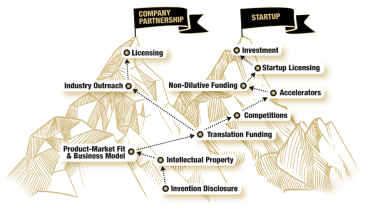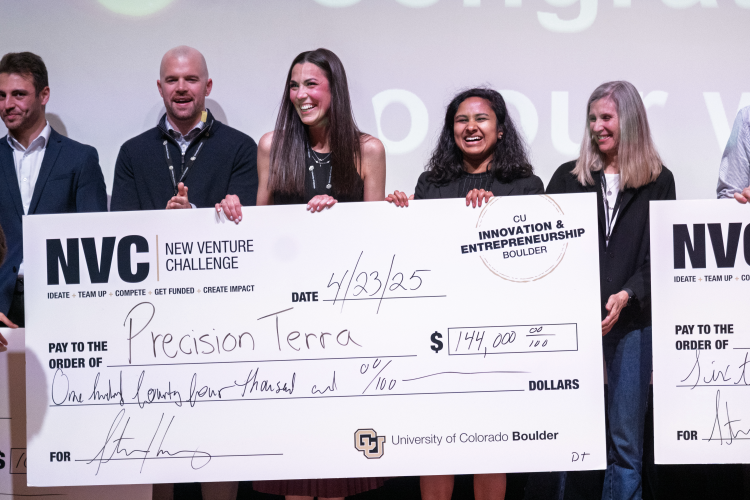CU Boulder awards pre-seed funding to alum’s promising GPS startup
Venture Partners at CU Boulder bridged a historic investment gap to move a deep tech startup a step closer to the marketplace by awarding $100,000 in pre-seed funding to PrecisionTerra, founded by CEO Maithreyi Gopalakrishnan (alum, CU Boulder Physics). Gopalakrishnan went on to win $144,000 in additional funding for the company in the 2025 New Venture Challenge.
Venture Partners created the pre-seed fund to help bridge the so-called “valley of death” between research and commercialization, where even high-potential start-ups can sometimes get lost, said Bryn Rees, associate vice chancellor for innovation and partnerships. “When somebody creates an innovation with broad potential to be translated out into a new venture, there is now funding to support the earliest stages of that new company,” said Rees. “This was a missing piece.”
With the new funding mechanism, the university supports company founders translating CU Boulder innovations with high potential for broad, real-world applications, said Rees. The fund is intended to help startups as they prepare for outside investment, a critical moment on their path to commercialization.
“It’s a demonstration of the university's commitment to innovation and to its faculty,” said Rees. “For CU Boulder to be a destination of choice for the most innovative faculty and students, it’s critical that we support and resource our innovators, and having this new investment mechanism, a pre-seed investment fund, is a really important part of that. This complements the many upstream funding resources, like the Lab Venture Challenge, and downstream resources, like Buff Gold Ventures.”
PrecisionTerra is commercializing a cutting-edge software solution that enhances coverage in GPS-degraded environments where signals are weak, including those with ‘vertical distractions’ such as tall buildings, deep canyons or even large trees. The breakthrough technology, which improves the signal strength of GNSS receivers, was developed by Jade Morton (CU Boulder Ann and H.J. Smead Aerospace Engineering Sciences), director of the Colorado Center for Astrodynamics Research and leader of the Satellite Navigation and Sensing Laboratory.
The tech addresses a critical market need in industries where poor GPS quality undermines performance, including mapping, autonomous vehicles and military operations. “What excites me about Dr. Morton's technology is its potential to improve the reliability of positioning systems used in mission-critical applications where human safety and economic stability are of utmost importance,” said Gopalakrishnan. “Think collision avoidance for autonomous vehicles, autonomous planting and harvesting operations for large-scale farming, and military navigation in active war zones.”

But what is "commercialization?"
The path to commercialization—also known as "research translation" or "tech transfer"—can be challenging, so Venture Partners unites industry partners, entrepreneurs and investors to help researchers, inventors and creators at the University of Colorado bring their groundbreaking discoveries into the marketplace.
An exceptional partnership
As an undergraduate, Gopalakrishnan was a Boettcher scholar and pursued a passion for engineering, entrepreneurship and dance. Post-graduation, she celebrates an enduring connection to the university and to strengthening community bonds. On a whim during the pandemic, Gopalakrishnan began volunteering as a mentor with Venture Partners and has seen several of those entrepreneurs develop flourishing, impactful companies.
Passionate about solving large-scale problems by leveraging frontier technology, Gopalakrishnan founded PrecisionTerra as an Entrepreneur in Residence (EIR) in the inaugural cohort of the Embark Deep Tech Startup Creator. Embark is a Venture Partners’ program that matches entrepreneurs with promising CU innovations and provides intellectual property (IP) rights, salary support, grant funds and investor introductions to selected EIRs.
Through Embark, Gopalakrishnan and others explored Venture Partners’ curated portfolio of CU Boulder technologies. “These were some of our top technologies that we believe could be, and should be, a startup,” said Marta Zgagacz, senior director at Venture Partners. Once Gopalakrishnan learned more about Morton’s remarkable research, she knew she wanted to form a company around it and pitched a commercialization plan to land the six-month spot as an EIR.
The Venture Partners’ team was impressed with Gopalakrishnan’s pitch, said Zgagacz. She had already tested the technology and engaged in customer discovery with big and small companies through the NSF I-Corps: Hub West Region programming offered through Venture Partners to find out how Morton’s GPS technology could meet their needs. “Because Maithreyi has the technical background and the entrepreneurial background, she’s really the full package,” said Zgagacz.

New Venture Challenge Deep Tech category judges Blair Simpson, principal, Denver Angels (left), and Joey Money, consultant, IndustriSpark (right), celebrate as D4 investments partner Kelly Coyne (center, left) hands Precision Terra founder and CEO Maithreyi Gopalakrishnan her $144,000 first prize check. Photo: Glenn Asakawa, CU Boulder.
In addition to Embark, Gopalakrishnan took part in other CU Boulder programs, including the New Venture Challenge, and has managed Catalyze CU and been a mentor for other aspiring entrepreneurs. It’s that long-term relationship and the fact that Gopalakrishnan has been an “exceptional partner,” said Rees, that made PrecisionTerra an obvious choice for the new pre-seed funding. “In Maithreyi, we’re attracting the interest of very talented entrepreneurs who want to be a part of the university’s entrepreneurial ecosystem,” he said.
Moving the needle forward
Already, PrecisionTerra has letters of intent from prospective customers and at least one cooperative agreement in place with a large GPS receiver manufacturer that is loaning the company some hardware to test software capabilities over the coming months. Gopalakrishnan emphasized that a software solution for GPS signal-weak environments is attractive to existing companies because it doesn’t require manufacturing new chips or motherboards which are lengthy and costly upgrades.
PrecisionTerra now has a fully operational end-to-end, software-based GPS signal processor. “It’s not yet a complete product, but it’s absolutely the foundation we need to do validation testing,” said Gopalakrishnan. The new pre-seed funding, combined with competition winnings and additional pre-seed funding from outside sources, will allow the company to hire a summer staff to perform critical testing proving how the PrecisionTerra’s tech bests what is on the market today.
“I was really honored to receive funding, and I think it’s going to be tremendously helpful in accelerating some early testing that we need to do,” said Gopalakrishnan. “We can take those results, go to prospective customers and say, ‘This is a commercial grade device and you can see how much more effective our ability to track GPS signals is’—and that would really move the needle forward for us as a company.”
Innovation incubator
The new pre-seed funding is the latest element complementing a robust ecosystem attracting the best researchers, entrepreneurs and investors to CU Boulder, said Rees. “The environment that we’ve created here in Venture Partners is an incubator through which founders can really prove themselves."
Gopalakrishnan credits Rees and colleagues for being there every step of the way, from curating outstanding innovations to PrecisionTerra’s founding and where the company is now. “At this point, Venture Partners really feels almost like a family that is there for me and has my back. They’re always thinking about ways and opportunities to provide us with support,” she said. “It’s all so valuable.”
In PrecisionTerra, Rees sees both proof of concept in how university innovators can imagine their work translated to commercial products (even if they don’t want to be the ones running the company) and how entrepreneurs can take that baton and carry it forward. “Maithreyi and others have laid out a great model of how to engage with the university, build a new venture, and get this initial investment. It’s a replicable model that others are already doing well,” said Rees. “And the more, the better.”
Winning big at the Boulder Theater
Most recently, PrecisionTerra garnered significant recognition at CU Boulder’s 2025 New Venture Challenge (NVC) Finals, where entrepreneurial teams of CU Boulder students, faculty and staff competed for a share of $325,000 in funding. Gopalakrishnan’s pitch secured the top prize of $144,000 in the newly introduced Deep Tech Category, which focuses on ventures built around scientific or technological innovations, a partnership between Venture Partners and NVC.
The recognition and funding from CU’s top-ranked entrepreneurial competition not only underscores PrecisionTerra's potential impact but also highlights the entrepreneurial spirit and opportunity fostered within CU Boulder's vibrant startup ecosystem.
What can we do together?
The Newsroom
For marketing and communication inquiries or news tips, contact Daniel Leonard, senior marketing and communications specialist for Venture Partners at CU Boulder.
For media inquiries, please visit colorado.edu/news/formedia.


